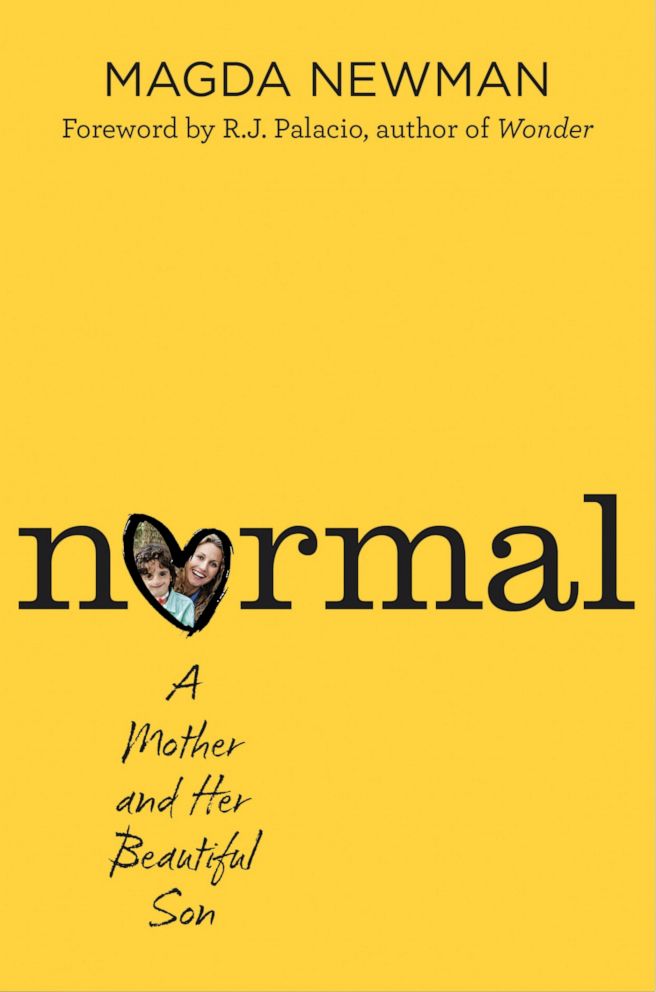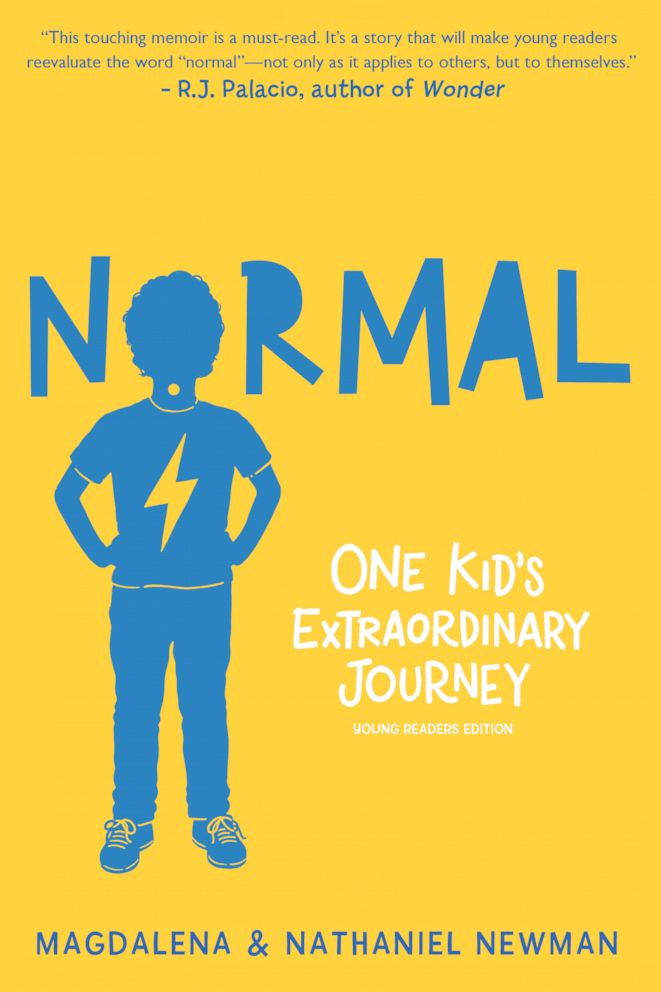Book excerpts: 'NORMAL: A Mother and Her Beautiful Son,' 'NORMAL: One Kid's Extraordinary Journey'
An excerpt from two books written by Magda Newman and her son, Nathaniel
The following are excerpted from "NORMAL: A Mother and Her Beautiful Son" by Magdalena Newman to be published by Houghton Mifflin Harcourt on January 14, 2020. Copyright © 2020. All rights reserved, and excerpted from "NORMAL: One Kid’s Extraordinary Journey" by Magdalena & Nathaniel Newman to be published by Houghton Mifflin Harcourt on January 14, 2020. Copyright © 2020. All rights reserved.
NORMAL: A Mother and Her Beautiful Son - excerpted from pages 3-7

1. beautiful
Nathaniel: In summer of 2017 when we got to Beaver Lake, I ran straight into the water. I was wearing a big Spider-Man floaty -- but only because it was a very deep lake. I paddled out as far as I could as fast as I could, singing to myself, “Don’t stop believing you can do this.” When my parents tell this story, it sounds like I was having a deep, spiritual moment, but in truth I was joking around, trying to swim to my mom, and wondering how far I could go.
When I got to what felt like the middle of the lake, I floated on my back, spreading out my arms and legs like a starfish, looking up at the blue sky. I was alone, truly alone. Nobody watching would have noticed me and thought, “Hey, that kid is alone.” After all, there were plenty of other people in the lake and I knew three of them. My mother was on a paddleboard. My brother and father were somewhere behind me. But, as far as I was concerned, I was alone, and today was not an ordinary day.
We’ve gone swimming as a family plenty of times. My dad used to be a lifeguard, so he loves to swim. I’ve watched him throw my brother, Jacob, in various pools and bodies of water for as long as I can remember. And countless times Jacob has cannonballed into the water right near me just to irritate my mother. Whenever we went to a pool or a lake, my mother, who never really learned to swim right, hovered near me in the shallow end, keeping the coast clear of splashy toddlers and annoying younger brothers. Every single time I went swimming, up until this day, I had to wear water wings on my hands and feet and a life preserver around my stomach to keep my head as far above the surface as possible. Even doggy-paddling would have put my neck dangerously close to the water. Water, in this situation, was my kryptonite.
But on this day, for the first time ever, the embarrassing flotation devices were gone. My mother was giving me space. For a good distance, all around me, there was only the flat lake. It was amazing and ordinary at the same time. I was thirteen years old, and I had never been able to swim by myself. I had put my head under water a few times, just for a few seconds, but that was completely against the doctors’ orders. Now, sixty-seven surgeries later, I could finally swim like normal kids, without the flotation devices bobbling around me, without an adult ready to help me if something went wrong.
Magda: If you looked at it from the outside, I had worked really hard for this moment: having operations to help me breathe, recovering, getting used to a new normal, then doing the whole thing all over again many times. But the surgeries didn’t feel like achievements I deserved applause for — I’d been having surgeries ever since I was born. What I felt in Beaver Lake wasn’t a sense of accomplishment, but a new level of independence. Like a first ride on the school bus. A sleepover. What I imagine it will feel like when I can finally drive a car. I’d wanted to swim by myself for so long it was hard to believe it was actually real. Though my brain was still processing the change, the water was energizing. The sky was wide open. The whole world stretched around me. I felt free.
It is hard to describe how I felt watching my son swim for the first time or what it represented for our family. Nathaniel had never been alone. It may not seem like such a big deal -- thirteen is still young -- but before that day at Beaver Lake, Nathaniel had never been in water more than a few feet from an adult, not in his entire life, and getting him there had been my full-time job. Before Nathaniel was born, his father and I were a typical young couple. Russel and I lived in a small apartment on the Upper East Side of Manhattan until I got pregnant and we moved across the river to Hoboken, New Jersey, where you could get more space — how perfectly normal. At the time, I was writing my thesis to earn my masters in music theory and composition at a music academy in Gdansk, Poland, where I was born. To help make ends meet, I also worked at a friend’s boutique, selling jeans. Russel was just getting started as an insurance underwriter at Chubb. We had decent health coverage, and I had a good doctor. I was twenty-four and healthy.
There was no reason to worry, no reason to do any special tests. At my six-month sonogram the doctor said, “His nose looks big,” and was surprised that my amniotic fluid seemed to be building up, but assured us there was no reason for real concern. I went into labor right on time and was pretty far along when Russel and I arrived at the hospital. My doctor smiled at me and said, “Do you want to hold your baby when he’s born?” “Of course I do! Yes!” I replied.
In addition to Russel, there were a couple nurses in the room and, because it was a teaching hospital, there were also some students. Sunshine poured through the windows, brightening the delivery room after a long night of labor, and the sheets below me felt crisp and sterile. This was finally happening. A baby! As the doctor de-livered Nathaniel, Russel stood beside him, wearing scrubs and cheering me on, saying, “Oh my God, you’ve got this! I see the head! He’s got dark hair.” Then, all of a sudden, a mask dropped over Russel’s excited face. His mouth opened in a silent wail, his eyes got huge, and he went white. He grabbed his hair and started pulling it. At the same time, a horrible smell entered the room. I waited to hear the cry of a newborn but instead, I saw every single person’s face change to the same mask of pure shock.
They hurried a bundle off to a little alcove connected to the de-livery room. Russel followed.
“What’s going on?” I asked. “Where’s my baby?”
Then I heard Russel wailing, “Oh God, oh my God!”
“Is the baby alive? ” I asked the suddenly hushed room. There was a quiet rush of activity off to the side where I could barely see them. Nobody answered me. “Is the baby alive?” I was shaking now, confused and terrified. What was happening? The silent baby, that dreadful smell, Russel’s howls. My doctor was still tending to me, finishing up his work with his head down, but otherwise nobody was paying attention to me. Nobody would even look at me.
Finally my doctor said, “Yes, he’s alive.” Nobody offered to let me hold him or see him. Nothing. They seemed scared to show me my son. From the corner of my eye I could see into the room where they were cleaning him, and when they lifted him up for a moment, I caught a glimpse of a cone-shaped head and eyes that looked big and swollen. It had been a rough birth, I told myself, maybe that was all. . . . I caught a glimpse of one ear. It didn’t look like a normal ear. Then I saw his profile. It wasn’t just his ear -- something was very wrong.
"NORMAL: One Kid’s Extraordinary Journey - excerpt from pages 187-188

Nathaniel: A kid like me, with sixty-plus surgeries under my belt before I turned fifteen, is not “normal.” And I guess you could say that the goal of all those surgeries was to make me normal. To help me breathe through my nose, eat through my mouth, close my eyes properly, hear without ears. To go to school without a nurse. To play without being careful of the trach. To shower without being helped by my mother (ugh). To speak more clearly. To swim. My parents and the doctors and I all agreed that we wanted me to be able to do those things effortlessly, or with as little effort as possible, like “normal” people.
But even if and when we succeeded, would I be normal then? I’d still be a kid who had more surgeries than most other people. I’d still look a little different, if you care about those things.
Where is the line between normal and not normal?
Who gets to draw that line?




